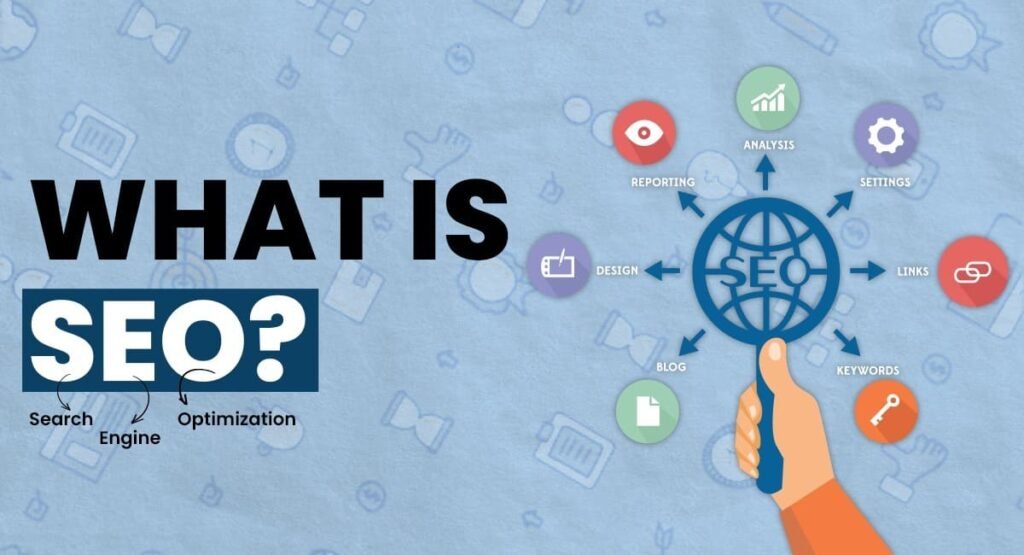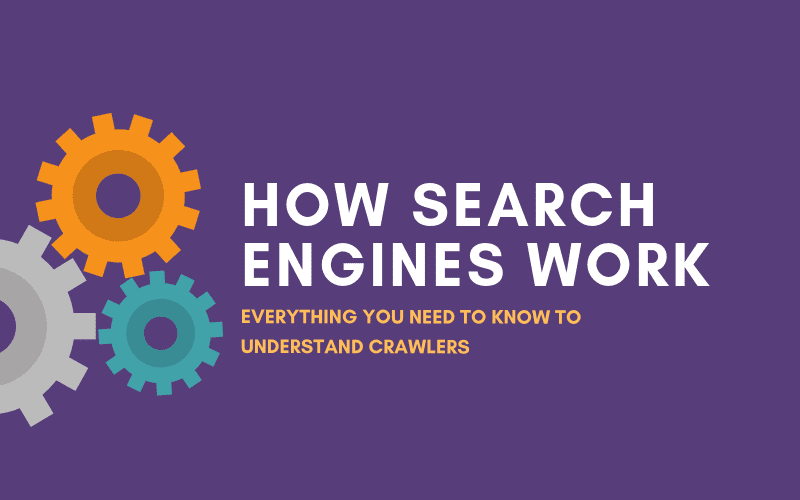Table of Contents
Introduction to SEO

In today’s digital age, the internet reigns supreme as the primary gateway to information and services. Search Engine Optimization (SEO) stands as a cornerstone in this landscape, strategically optimizing websites to boost visibility and ranking on search engine results pages (SERPs). By aligning with algorithms of major search engines like Google, Bing, and Yahoo, SEO drives organic traffic, enhances user engagement, and facilitates online success. As the digital realm evolves, mastering SEO becomes increasingly vital for thriving in the competitive online marketplace.
What is SEO

Search Engine Optimization (SEO) is a comprehensive strategy that boosts website visibility and ranking on search engine results pages (SERPs). It optimizes various website elements, on-page and off-page, to align with algorithms of search engines like Google, Bing, and Yahoo. SEO’s primary goal is to increase organic traffic by enhancing relevance, authority, and user experience, leading to higher rankings for relevant search queries. Techniques such as keyword optimization, content creation, link building, and technical enhancements help attract qualified traffic, generate leads, and achieve online objectives effectively in the competitive digital landscape.
Importance of SEO

critical component of any digital marketing strategy. By investing in SEO, businesses can improve their online visibility, attract more qualified traffic, and ultimately, achieve their goals more effectively in today’s competitive online landscape.
- Increased Visibility: SEO helps improve a website’s visibility on search engine results pages (SERPs). By optimizing for relevant keywords and following best practices, websites can appear higher in search results, making them more visible to potential visitors.
- Organic Traffic: Ranking higher in search results leads to increased organic traffic. Unlike paid advertising, organic traffic comes from users who find the website through a search engine, making it a valuable and cost-effective source of traffic.
- Credibility and Trust: Websites that rank higher in search results are often perceived as more credible and trustworthy by users. By consistently appearing at the top of relevant search queries, a website can establish authority and build trust with its audience.
- Better User Experience: SEO involves optimizing various aspects of a website, such as site speed, mobile responsiveness, and user interface, to enhance the overall user experience. A well-optimized website is more likely to engage visitors and encourage them to explore further.
- Competitive Advantage: In today’s competitive online marketplace, having a strong SEO strategy can provide a significant competitive advantage. By outranking competitors in search results, a website can attract more traffic, leads, and customers.
- Long-term Results: While SEO requires time and effort to see results, its effects are long-lasting. Unlike paid advertising, which stops generating traffic once the budget runs out, the benefits of SEO can continue to compound over time, leading to sustained growth and success.
Overall, SEO is a critical component of any digital marketing strategy. By investing in SEO, businesses can improve their online visibility, attract more qualified traffic, and ultimately, achieve their goals more effectively in today’s competitive online landscape.
How search engines work

Understanding how search engines work is essential for anyone looking to optimize their website for better visibility and ranking. Here’s an overview of how search engines like Google, Bing, and Yahoo operate:
- Crawling: Search engines use automated programs called crawlers or spiders to navigate the web. These crawlers follow links from one page to another, continuously discovering new content. They gather information about web pages and store it in a massive index.
- Indexing: Once a crawler visits a web page, it analyzes the page’s content, including text, images, and other elements. The search engine then indexes the page, cataloging it in its database along with relevant keywords and metadata. This indexing process allows the search engine to retrieve and display relevant pages when users enter search queries.
- Ranking: When a user performs a search query, the search engine retrieves relevant pages from its index. It then ranks these pages based on various factors, including relevance, authority, and user experience. Pages that are deemed most relevant and authoritative for the search query are displayed higher in the search results.
- Algorithm: Search engines use complex algorithms to determine the ranking of web pages. These algorithms take into account hundreds of factors to assess a page’s quality and relevance to a search query. Factors may include keyword relevance, backlink profile, page load speed, and user engagement metrics.
- User Experience: Search engines prioritize delivering the best possible user experience. They consider factors such as page load speed, mobile-friendliness, and security when ranking pages. Pages that provide a positive user experience are more likely to rank higher in search results.
- Personalization: Search engines may personalize search results based on factors such as the user’s location, search history, and preferences. Personalized search results aim to provide users with the most relevant and useful content tailored to their individual needs.
- Continuous Updates: Search engines frequently update their algorithms to improve the quality of search results and combat spammy or low-quality content. These updates can have a significant impact on search rankings, requiring website owners to stay informed and adapt their SEO strategies accordingly.
Overall, search engines work tirelessly to provide users with relevant, high-quality content in response to their search queries. By understanding how search engines operate and optimizing their websites accordingly, website owners can improve their visibility and attract more organic traffic from search engines.
Major search engines
The digital landscape is dominated by several major search engines that play a significant role in determining online visibility and accessibility. Here are the primary search engines:
- Google: As the most widely used search engine globally, Google holds the lion’s share of the search market. With its sophisticated algorithms and vast index of web pages, Google delivers highly relevant search results to users around the world. Google’s search engine not only provides traditional web search but also offers specialized search features like image search, news search, and video search.
- Bing: Developed by Microsoft, Bing is the second-largest search engine, although it trails behind Google in terms of market share. Bing offers similar search functionalities to Google, including web search, image search, and video search. It powers the search functionality for Microsoft’s various products and services, including the Microsoft Edge browser and Windows operating system.
- Yahoo: Once a dominant player in the search engine market, Yahoo now operates as a subsidiary of Verizon Media. While Yahoo’s search engine market share has declined over the years, it still maintains a significant presence, particularly in specific regions and among certain demographics. Yahoo Search provides web search, news search, and other search features.
- Baidu: Baidu is the leading search engine in China, where it commands a dominant share of the market due to government restrictions on other search engines. Baidu offers web search, image search, video search, and various other services tailored to the Chinese market. It also provides specialized features like Baidu Baike (similar to Wikipedia) and Baidu Maps.
- Yandex: Yandex is the most popular search engine in Russia and other Russian-speaking countries. It offers a wide range of search services, including web search, image search, video search, and news search. Yandex’s search algorithms are optimized for the Russian language and the unique characteristics of the Russian internet landscape.
While Google remains the undisputed leader in the global search engine market, other search engines like Bing, Yahoo, Baidu, and Yandex cater to specific regions and demographics, providing users with alternative options for accessing information online. Understanding the characteristics and preferences of these major search engines is essential for website owners looking to optimize their online presence and reach their target audience effectively.
Components of SEO

SEO comprises three main components: on-page, off-page, and technical SEO, each playing a vital role in improving search engine rankings and driving organic traffic.
On-page SEO Techniques
On-page SEO focuses on optimizing individual web pages to rank higher and earn more relevant traffic. Key techniques include keyword optimization, creating high-quality and relevant content, and crafting compelling meta tags and descriptions.
Off-page SEO Techniques
Off-page SEO refers to activities done outside of your website to improve its search engine rankings. This includes building high-quality backlinks, leveraging social media signals, and managing online reputation effectively.
Technical SEO Essentials
Technical SEO involves optimizing the technical aspects of your website to enhance its crawling and indexing capabilities by search engines. This includes optimizing site speed, ensuring mobile-friendliness, and structuring the site hierarchy for better navigation.
Conclusion
SEO plays a pivotal role in shaping online visibility and driving organic traffic to websites. By understanding the components of SEO, leveraging best practices, and staying abreast of emerging trends, businesses can enhance their online presence and reach their target audience effectively.
Read Also:- Top 10 Best SEO Tools For Digital Marketing In 2024 To Boost Online Visibility
FAQs
What exactly is SEO?
SEO, or Search Engine Optimization, is the process of optimizing your website to rank higher in search engine results pages, thus increasing visibility and driving organic traffic.
Why is SEO important for businesses?
SEO is essential for businesses as it helps improve online visibility, attract relevant traffic, and ultimately, drive conversions and sales.
How long does it take to see results from SEO efforts?
The timeframe for seeing results from SEO can vary depending on various factors such as the competitiveness of keywords, the quality of optimization efforts, and the overall authority of the website. Generally, it can take several weeks to months to see significant improvements in rankings.
Are there any risks associated with SEO?
While SEO can yield significant benefits, there are also risks involved, such as potential penalties from search engines for engaging in black hat SEO tactics. It’s crucial to adhere to ethical SEO practices to avoid such risks.
How can I stay updated with the latest SEO trends and algorithms?
Staying updated with the latest SEO trends and algorithms requires continuous learning and monitoring of industry news and updates. Following reputable SEO blogs, attending webinars, and participating in forums can help stay informed.



Leave a Reply